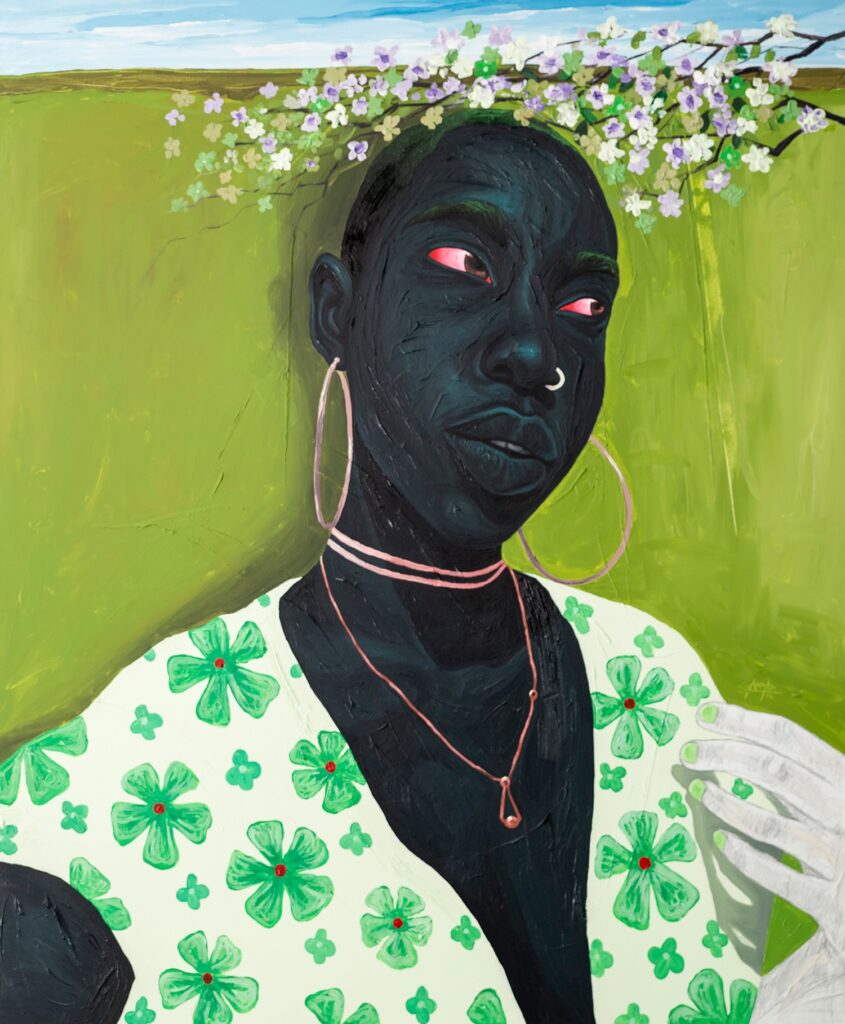
By Paul Laster
Charmed by art since childhood, Annan Affotey started drawing figures from movie posters and comic books at age 11 and pursued this interest further in secondary school, where he also became fascinated with fashion. Attending the distinguished Ghanatta College of Art and Design, where Amoako Boafo was a classmate and Serge Attukwei Clottey had studied art, Affotey won multiple awards for his creative talents before graduating in 2007.
He began exhibiting his work with the Revolution Art Organization in his Ghanian hometown of Accra while still in college and continued showing regularly once he earned his degree. After helping to found the African Young Artist Organization in 2013, the following year he took a leap of faith and moved to America, where he continued to create art in Milwaukee, while attending artist residencies and exhibiting his work in various cities in the United States and Africa.
By chance, it was in America where his current style of portraiture coalesced. Continuously questioned about the redness of his eyes, which is a more common attribute in Africa, the artist made it a component of his portrait painting—because it was how people saw him. Feeling misunderstood by Americans and longing for home, he began asking friends in Ghana to send him pictures of them and then started working from photographs of people that he followed and discovered on social media sites.
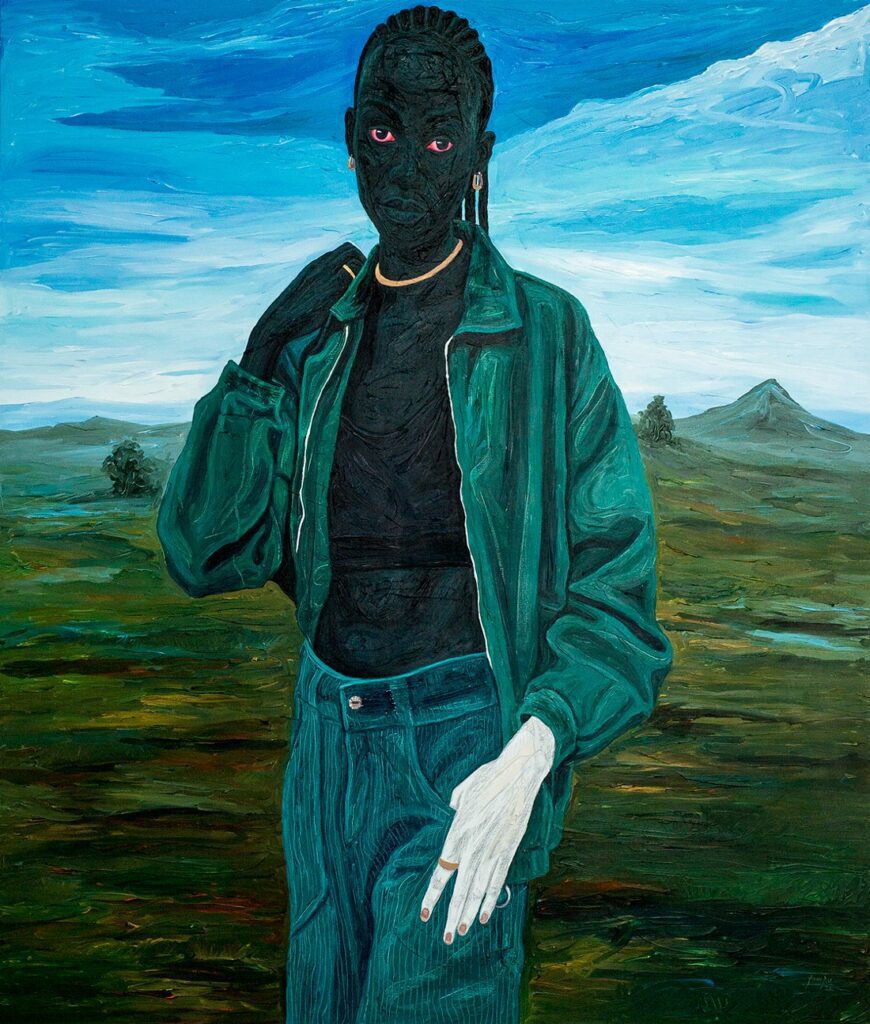
Drawn to the poses that he remembered from growing up in Ghana, he became attracted to the naturalness of his subjects. Using the photograph as the point of departure, Affotey makes a sketch, applies modeling paste to his canvas to give it texture and then brings the subject to life in his painting. Mixing charcoal with acrylics, he purposefully paints the complexions of his subjects a deep, deep black—wanting to powerfully portray that “Black is Beautiful,” and that a dark complexion should be a source of pride.
His style of painting was actually motivated by the birth of his son. Relocating to England in 2019, he set up his studio in Oxford, where his wife is getting her MBA. Taking time off to care for their newborn, he started seriously thinking about the voice he wanted to establish as an artist. Getting back to his Ghanian roots by working with his friends photographs he felt a more spiritual connection to his personal reality. And through further experimentation, he came upon a style that was uniquely his own.
In 2020, Affotey began developing his “Complexion Series” of closely cropped figures with dark skin colors and red pupils—first with self-portraits and then portraits of others—on boldly shaded backgrounds. By 2021, he was exhibiting his dynamic portraits. In May of that year, he had his European solo show at Ronchini Gallery in London, where he exhibited vibrant realistic paintings of family and friends, including a triple self-portrait, titled Transformation, with views of how he saw himself: first in Ghana with lighter eyes, secondly with medium red eyes and, lastly, with darkly reddened eyes.
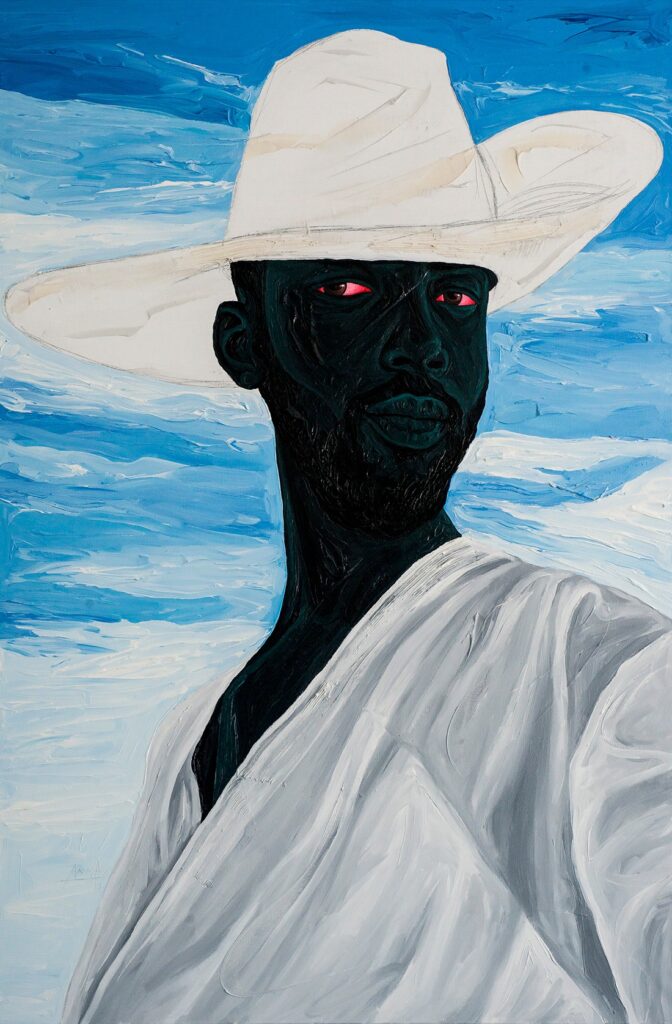
The paintings in the Ronchini show were also important in that they introduced another style, which the artist employed for the first time, that would carry over to current work. Leaving sections of the canvases drawn but unpainted—particularly hands, arms or bits of clothing—Affotey gave his work the appearance of being unfinished, while making the viewer have to realize that what they were looking at was a work of art, not just the likeness of a person. Amongst the portraits on view were two paintings of people with dogs, which would lead to a whole body of work later in the fall.
In demand, Affotey quickly followed up the London exhibition with a show at Gallery 1957 in Accra. Titled “Ghanatta Strong,” the exhibition featured lively portraits of artist alumni of the Ghanatta College of Art and Design. Depicting both men and women, as well as teachers and colleagues, his “Ghanatta Series,” which Affotey began in 2020, included portraits of such celebrated artists as Kwesi Botchway, Amoako Boafo, Otis Kwame Kye Quaicoe and Serge Attukwei Clottey.
Traveling from London to Los Angeles for six weeks, he completed his next body of work, which was mostly portraits of people with dogs, at The La Brea Studio Artists Residency. He was attracted to dogs because he had one when he was a child, but it had passed after two years. In Ghana dogs are kept outside and are commonly seen roaming the streets, which made their domesticity in America, where they are treated like part of the family, all the more fascinating to the artist. Large in scale, the series of paintings was exhibited in “A Little Companionship” at Cabin LA, a gallery space built in the style of Unabomber Ted Kaczynski’s cabin in Montana.
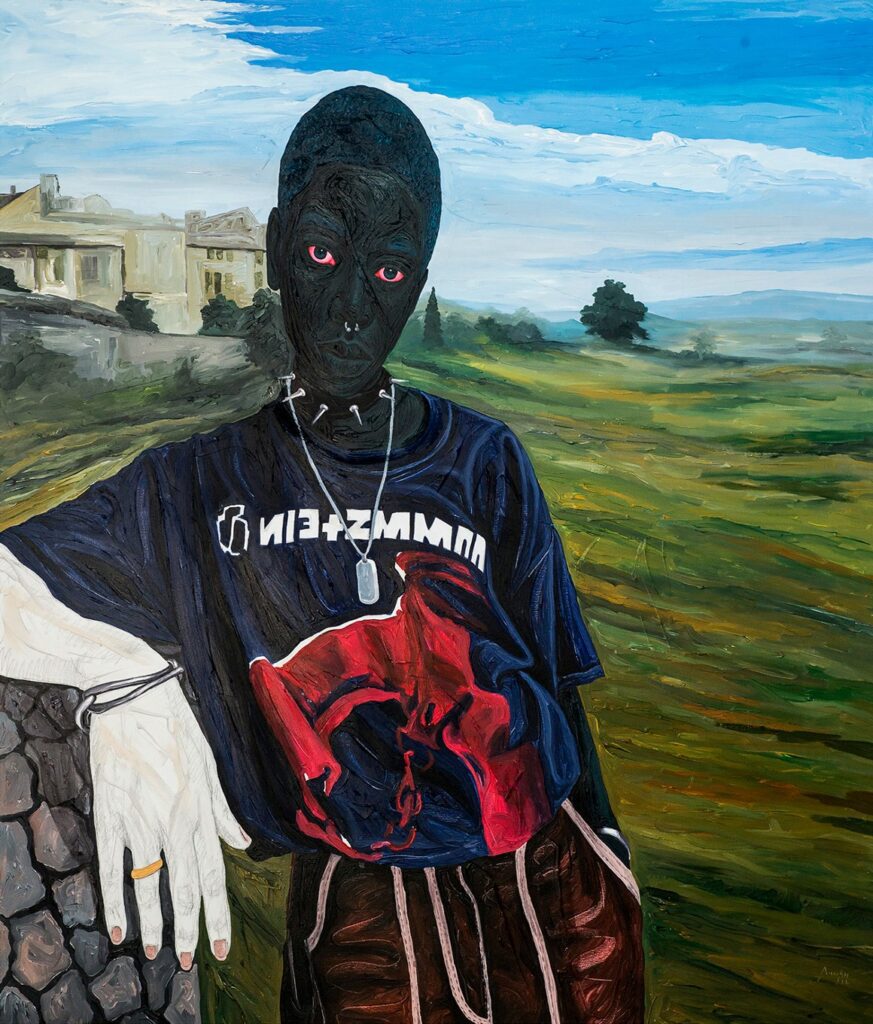
Tunji Adeniyi-Jones had shown at Cabin LA in 2018 and Amoako Boafo in 2019, and after his solo show Affotey’s Instagram following jumped up to 16,000 followers, even though he had only done 25 posts. Around this time, agents for Tommy Hilfiger discovered his art on Instagram and commissioned him to create paintings for an ad campaign for the company’s Tommy Hilfiger X Romeo Hunte fashion design collaboration. One of two artists chosen for the campaign—Affotey was selected for the project in Europe and the Nigerian artist Uzo Njoku was picked for the United States—he made two paintings of stylishly dressed models in his signature style that were then repainted as a massive mural in East London.
Another collaboration is in the works however under wraps, but since the start of this year the artist’s focus has been researching and developing his latest series of paintings, “Nature’s Complexions,” for his exhibition in the South of France, which is currently on view at De Buck Gallery in Saint-Paul de Vence. Painted during his month-long residency in the medieval town, the series takes his portraiture into a pastoral setting. Working from his own photographs and ones culled from the internet, Affotey painted his subjects into a rural terrain, surrounded by mountains, blue skies, flowers and chateaus.
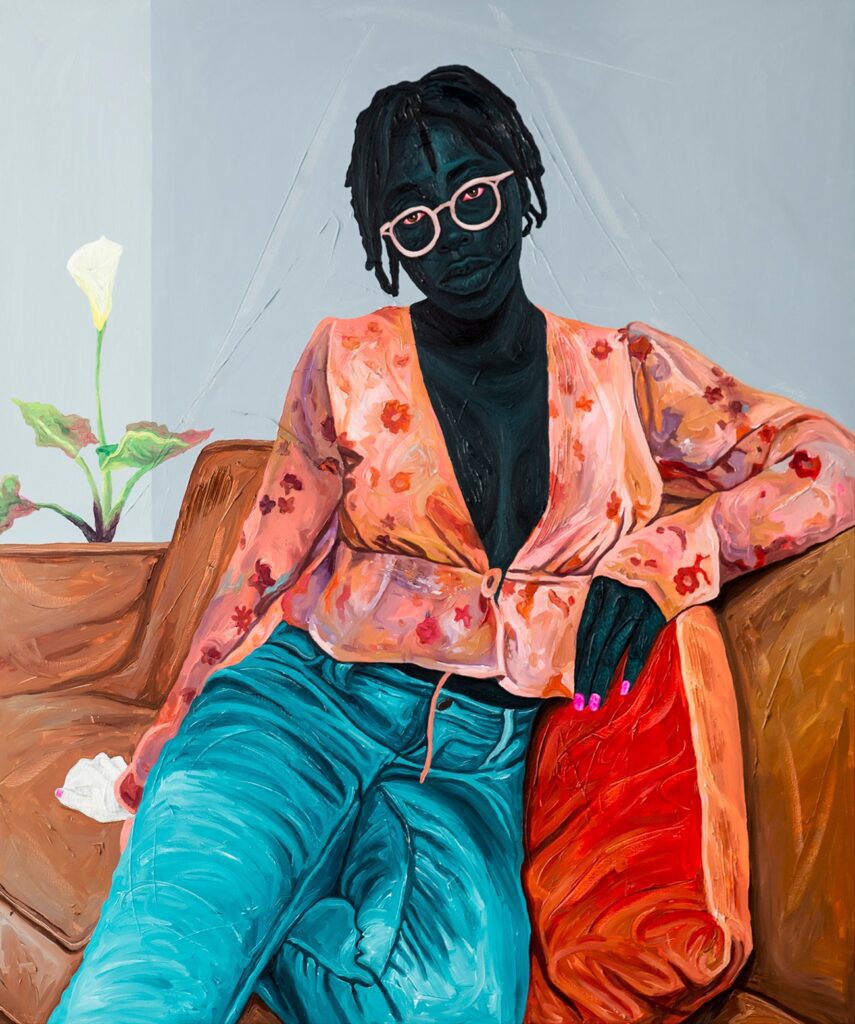
The paintings Under the Flowers and Blending In (St Paul de Vence) capture one of his favorite subjects, the Ivorian actress Ky Florencia, whom he discovered on Instagram and then asked if he could use her photos for his paintings, to which she wholeheartedly complied. Portrayed in the same Afropunk outfit in Blending (St Paul de Vence) that she’s wearing in an Instagram photo from January, Affotey has posed her in front of a country estate, but he’s left her right arm and hand unpainted—much like Cézanne did when he left areas of his landscapes in the South of France untouched by the brush. The blood-red dye of her T-shirt design is reiterated in the pupils of her eyes—drawing the viewer into her soul to share her inner beauty.
The arresting portrait Blue Sky (Joseph Awuah-Darko) portrays the sophisticated Ghanaian musician and philanthropist dressed in white against a blue sky beautifully laden with stratus clouds. His mustache and beard are barely visible on his strong black skin, while his white brimmed hat is simply yet dynamically defined by patches of modeling paste and a few well-placed pencil lines. But it’s the red eyes that stop us in our tracks—sustaining our gaze as we assess the marks that make each and every painting by this artist a pleasure to see.

